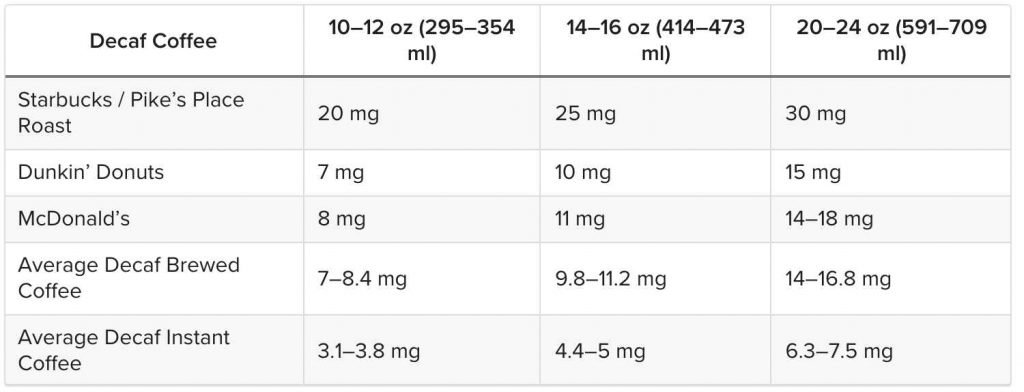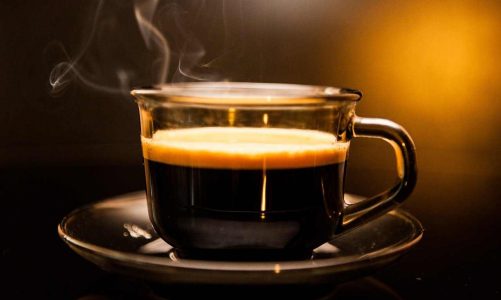Coffee can be addictive, and too much caffeine consumption can cause nervousness, increased heart rate, and several side effects, that’s why some people switch to decaf coffee. But does decaf coffee have caffeine in it still? It would be reasonable to assume that decaf coffee has no caffeine as the clue is the “de” which means removal, but that’s not the case here.
According to the National Coffee Association in their article the Atlas of American Coffee, 7 out of 10 Americans drink coffee every week and an American drinker consumes around an average of 3 cups of coffee in a day, that’s a lot of caffeine. Actually, it’s around 95mg per regular-sized cup with the safe allowance being 400mg daily.
For some people, switching to decaf coffee is not just a personal choice, it’s doctors’ orders. Whether it’s for health reasons or psychological reasons, there may be a reason you need to avoid caffeine, so it’s useful to know some more about the caffeine content of decaf coffee.
Don’t forget to take a look at the best low acid coffee and the best decaf coffee you can buy.
The Process Behind Decaffeinating Coffee
Decaffeinated coffee is coffee made without most of the caffeine. The process of decaffeinating coffee removes around 97% of the caffeine or even more in the coffee beans.
Decaffeinating can be achieved by using either water or solvents. The most common method is to use a solvent such as methylene chloride, activated charcoal, supercritical carbon dioxide, or ethyl acetate. The process happens before the beans are roasted so the actual taste and flavoring are unaffected.
The first method is more typically used for decaffeinating green coffee beans that will go into ground coffee and be brewed as regular (non-decaf) coffee; this ensures that no caffeine will remain in the finished product.
The second method can also be used on green beans for brewing as regular (non-decaf) coffee; using solvents or additional chemicals is the most popular decaffeinating process since the solvents help speed up the process. Speeding up the decaffeinating process minimizes the removal of non-caffeine elements.
Does Decaf Coffee Have Caffeine?
The truth is, decaf coffee does actually contain caffeine, however, it is much less than a regular cup of coffee. The decaffeinating process of coffee removes up to 97% of caffeine content. This leaves a small percentage of caffeine in decaf beans. According to USDA regulations and guidelines, decaf coffee should not exceed 0.10% of caffeine.
So, although the name suggests that there is no caffeine, decaffeinated coffee still has some caffeine content.
One cup of decaf coffee contains about 2 milligrams of caffeine. However, most people drink more than one cup of coffee in a day, so this amount of caffeine can still equal to around 10% of your regular intake. Therefore, if you want to cut out caffeine completely, consider cutting out coffee altogether. Don’t forget about caffeine in other products too, such as soda.

Decaffeinated Coffee Vs Regular Coffee
Decaffeinated coffee is a type of coffee that has been processed to remove caffeine from the beans. The process of decaffeinating usually involves soaking the beans in a solvent such as methylene chloride, which reduces the caffeine content to 0.1% of its original level.
Regular coffee is any kind of coffee that has not been decaffeinated and contains around 95 mg of caffeine. This is an average number, there are some coffee brands that produce coffees with around 200mg per cup.
Some people worry that the taste of decaf coffee will be worse than regular coffee, but this isn’t true. You actually won’t really notice a difference in taste. The process happens before the coffee is roasted, so flavors are generally unaffected.
Related: How much caffeine is in espresso?
Can You Get Too Much Caffeine from Drinking Decaf Coffee?
Decaffeinated coffee is not as widely used as regular coffee, but it does offer health benefits. For those who are worried about the long-term effects of caffeine on their system, decaf coffee is a great alternative. However, decaf contains caffeine and can lead to side effects like headaches and sleep problems.
People that drink 1-2 cups of coffee per day should consider switching to decaffeinated because it is more effective in aiding weight loss and improving heart health than regular java. Those who drink more than 3 cups of coffee should switch because they may be getting too much caffeine from their intake.
The Final Sip
Does decaf coffee have caffeine? The ultimate answer is yes, it does contain a small amount of caffeine. The percentage is much lower and has to meet regulations of being under 0.10% caffeine, but decaf coffee does still have caffeine content.




